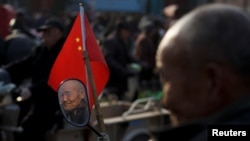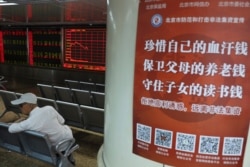China is the world’s most populated country but decades of a strictly enforced one-child policy, shortage of social security funds and a comparatively young retirement age is forcing Beijing to act in the face of a shrinking work force.
Analysts estimate the country’s labor force will lose 35 million workers over the next five years and that during that same period, the number of citizens eligible for retirement will surge to more than 300 million. That’s almost the entire population of the United States.
They also note that over the next decade, the country will be looking at a social security shortfall of $1 trillion. But getting people to agree to changes in the retirement age has never been easy regardless of whether it is France, Russia, the U.S. or China.
Ready to retire
According to a survey conducted last year by the Changjiang Daily in Wuhan, more than 80% of the 96,000 responders online opposed delaying the retirement age, mainly because of their physical decline and the difficulty in finding suitable jobs.
However, some see benefits in the change. “Your income will decrease after you retire,” one Beijing resident told VOA, explaining that, if her physical condition allows her to continue working, and she has nothing else to do, delayed retirement may be a better long term financial plan.
Chinese officials have slowly been warming the public up to the idea. At recent high-level political meetings in Beijing, they it clear that change is coming — albeit gradually.
In his annual work report, Chinese Premier Keqiang Li said the retirement age should be raised "to implement a national strategy to actively address the aging of the population."
In an interview Saturday, Jin Weigang, who heads the Chinese Academy of Labor and Social Security, which operates under the Ministry of Human Resources and Social Security (MOHRSS), told the state-run Xinhua News Agency that China will raise the retirement age incrementally, extending it by a few months each year until the reform is completed.
You Jun, vice minister of MOHRSS, said China's current retirement age is generally low, does not match life expectancy and runs counter to demographic changes.
"China is expected to have an 8-10 trillion RMB (USD $1.13-1.4 trillion) pension gap over the next 5 to10 years, and this gap will widen over time," predicts the China Insurance Industry Association in a report on pensions released November 20, 2020.
Male workers retire in 60
The current statutory retirement age in China is 60 years for male workers, 55 years for female cadres and 50 years for female workers. Cadre is a general term for civil servants working in the government, public institutions and state-owned enterprises. Labor regulations do not differentiate between male cadre and male workers.
Beijing did not specify a target retirement age. By comparison, the current retirement age in the U.S. is 66, although that depends on the year of birth. The global average was 62.7 years for men and 61.3 years for women, according to an analysis of 70 countries by insurer Allianz SE, reported Bloomberg.
You of MOHRSS said that the retirement age was set in the early 1950s, when people were expected to live about four decades. In 2019, life expectancy in China was 77.3 years nationwide, with city dwellers expected to keep going past 80 years.
Those numbers mean Beijing must raise the retirement age, according to You, who delivered the population figures at a press conference on February 26.
You also said that by the end of 2019, more than 18% of China’s population, or 254 million people, were aged 60 or older. Current growth rates suggest the population of people who are 60 and over will exceed 300 million sometime between 2021 and 2025.
At the same time, You said that China's working-age population has been declining for the past 10 years, by more than 3 million workers a year since 2012, and it’s expected to decrease 35 million in the next five years.
Dip in population expected
Dongliang Zheng, director of the Institute of Labor Science at MOHRSS, predicted last year that China's working-age population would decline sharply after 2020, from a peak of more than 900 million in 2011 to about 700 million in 2050.
China’s one-child policy has contributed to the aging problem. Chinese family planning officials once said that about 400 million fewer people had been born in the past several decades, according to China’s official People’s Daily.
In 1979, the Chinese government introduced a nationwide one-child-per-couple policy, with some exceptions, to slow population growth. Although the policy ended in 2015, the nation’s birth rate has been declining overall since.
Preliminary figures released in February from the Chinese Ministry of Public Security, quoted by Reuters showed the number of new birth registrations in 2020 was 10.035 million, compared with 11.8 million in 2019. The birthrate for 2019, at 10.48 live births per 1,000 people, was the lowest since 1949, the year the People's Republic of China was founded.
One-child policy
Frank Xie, a professor with the University of South Carolina-Aiken Business School, said consequences China’s one-child policy are emerging.
"The Communist Party's family planning policy has been in place for so many years, and although it has now been abolished, young people are now reluctant to have more children because of increasing living expenses, such as housing, health care and education. China's one-child policy has led to a decline in the number of young people,” he said.
“Now that high prices are causing young people to be reluctant to have children, China's demographics are becoming increasingly imbalanced, which exacerbates the problems caused by aging,” he added.
Fu-Xian Yi, senior scientist of obstetrics and gynecology at the University of Wisconsin-Madison, who has been critical of China’s one child policy according to CNBC, said, “The whole economic and social pattern is planned for the one-child policy, which is difficult to change. Therefore, China's fertility rate is very low.”
Fewer working-age people means fewer workers contributing to social security funds.
Yi said that when China established its retirement system in the 1950s, it was a younger country with a large labor force and very few people old enough to be on social security.
Since then, major demographic changes have taken place. Family planning has led to an aging population structure, the number of people receiving social security continues to increase, and the number of people contributing to social security gradually decreased, which brought a major burden — even a shortage — to current social security funds. Yi said the central government must provide additional funds to fill the gap.
“As a result of one-child policy, the labor force is declining, and aging is accelerating. China’s rate of aging is the fastest in the world. We are old before getting rich,” Yi said. “The gap in social security funds is growing, which is very troublesome.”
Adrianna Zhang contributed to this report.

